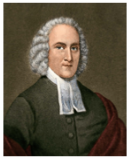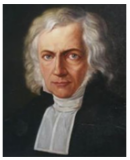Schleiermacher wanted to make Christianity relevant to the modern age. Sound familiar? He said, "True religion is about the living experience of the divine, not about the dead letter of doctrine. It is about "a living experience of the divine, a taste for the infinite." He believed that true religion needs to be experienced. Everyone wants to experience God, right? Sounds exciting! The foundation stone of the Christian faith was this "the essence of piety was to have a conscious of being absolutely dependent."
Sin, you see, is the loss of God consciousness. Man forgetting God. A failure of a feeling toward God. The forgiveness of sins is the cleansing of my consciousness of guilty feelings. The question then is, "Where did sin come from?" Answer: Man makes it up. Evil is the sinful loss of God consciousness. Sinners are saved or redeemed when they achieve a constant potency of his God consciousness and become like Christ. Salvation is inspiration. Focusing on Christ's God consciousness and forgetting our own is the essence of what it means to be a Christian-to have an ongoing and uninterrupted consciousness of being absolutely dependent on God consciousness. Ohhhh, Uh?
Christianity was the culmination of an evolutionary process of religion. There are no right and wrong expressions of religion, just steps in the process. The OT was a primitive form in the development of religion, and the Trinity, for example, was simply a preliminary step in the development of God consciousness. History is the record of the development of evolutionary process of the conscious dependence of God. (Darwin's biological evolution, by the way, comes out of an already existing popular evolution understanding of reality in the 19th century).
His premise was that Christian doctrine, "propositional truth claims" are accounts of Christian's religious affections set forth in speech. The NT is simply the apostles expressing their feelings and this inspires us to do better. Eschatological language is not really about future events, since no one can know the future, but an idea in which we can aspire, to help us do better. The last judgment is about the separation of the Church from the world. There is no hell, no eternal punishment since the eternal blessedness of Christ's consciousness is being disseminated throughout humanity.
Schleiermacher questioned every fundamental doctrine and redefined everything. There was no fall, no sin, no atonement, and no intervention of God in human history, no personal relationship with God. He turned everything on its head.



















